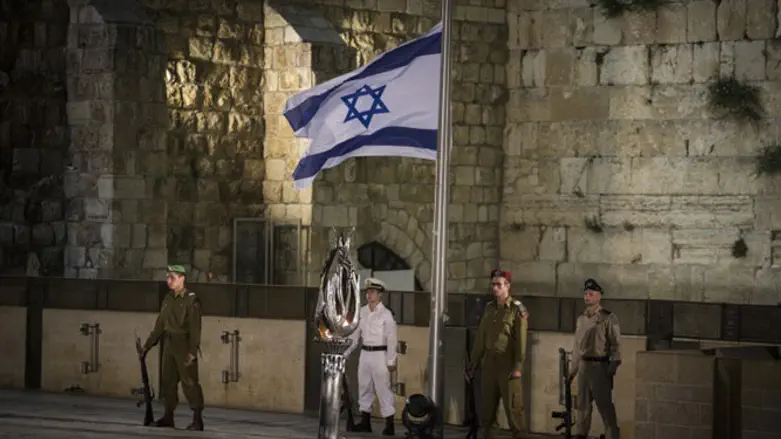
On Israel’s Rememberence Day for its fallen soldiers and victims of terrorism, Wednesday, April 14, sadly, there are so many dear souls to remember. Friends, family members, neighbours, members of our community and beyond. There is almost no one in Israel untouched by this reality. Many of these unique individuals remain in my memory throughout the year but as this day approaches, one cannot help give some extra thought to who these people were, what they achieved and stood for in their too short lives and where they would be today.
One of them, is my dear friend, Eyal Banin.
On my final night of basic training in the Israeli army, June 14, 2002, I was part of an IDF unit made up of 60 soldiers who, laden with 30 kilograms (66 pounds) of equipment and ammunition on our backs, set off on a gruelling 70-kilometer (43-mile) hike along the hilly Negev desert in the southern part of Israel. This maneuver was the climax of almost five months of basic training and at the end of it we were to receive our unit’s beret.
It was the height of the Second Intifada, and due to security precautions, all army hiking routes had been redirected to the Negev desert in order to avoid proximity to the nearby Palestinian Arab villages and cities. Approximately fifteen kilometers into the hike as the sun was setting, we passed a construction site with large Caterpillar diggers parked on the side. With the exception of one soldier at the back of the group, no one noticed that one of the trucks had started its engine and was making its way in the direction we were walking.
The driver of the digger positioned his machine alongside the two rows of soldiers, lifted the vehicle’s large spade, and as he shouted, Allahu Akbar, (God is great, in Arabic,) he put his foot on the gas pedal and sped full-throttle toward us, intent on killing as many soldiers as he could. With the vehicle closing in on us, chaos ensued, with soldiers running in every direction to get out harm’s way.
Much to our consternation, our commander issued an order forbidding us from firing even one bullet. He later explained that he did not feel at the time that our lives were enough in danger! The driver of the Caterpillar continued approaching a group of soldiers who managed to get out of the way in time. Then he reversed, lined up again and attempted to trample a different group. This time he came very close. But our orders not to shoot were clear so all we could do was to run for our lives.
Eventually, defying the commander’s orders, Itzik, a small kibbutznik from the north of Israel, decided he had seen enough. He picked up a rock, ran right up to the side of the digger and threw the rock hard at the driver, striking him in the head. The driver fell out the digger and lay unconscious on the ground. The vehicle continued its own for about 20 meters (65 feet) and then came to a halt. We were all relieved that the incident had come to an end without any injuries to our group, but many of us were upset at the orders we had received which we felt had not allowed us to defend ourselves but had instead put our lives in danger.
I will never forget, however, what happened next. As the commotion began to abate, I looked up and saw our unit’s medic, Eyal Banin, kneeling on the ground at the terrorist’s side, administering first aid. The incongruity of the moment was blatantly apparent. Here was an Israeli soldier saving the life of someone who had just tried to murder him and his friends. Eyal didn’t hesitate in his work, determined to save the life of the injured man. He stopped the bleeding, cleaned the wound and applied the necessary bandages. He poured him some water and slowly brought him back to life. We all waited until the ambulance and police arrived and then continued our march into the night.
In 2006, on the final day of his annual reserve duty, Eyal was killed by Hezbollah terrorists in a cross border ambush, in which two other soldiers, Ehud Goldwasser and Eldad Regev, were killed and their bodies abducted. The event shook the country and triggered the start of the second Lebanon War. Staff Sergeant Eyal Banin, an only child, from the southern Israeli city of Beersheba, had striven desperately to become a combat soldier, so he could contribute to the defense of his country, a move at odds with the IDF directive that requires an only child to get special parental permission before enlisting.
Eyal already had plans to move to Jerusalem with friends and study at the Hebrew University when his life was so tragically cut short. He was a dear friend.